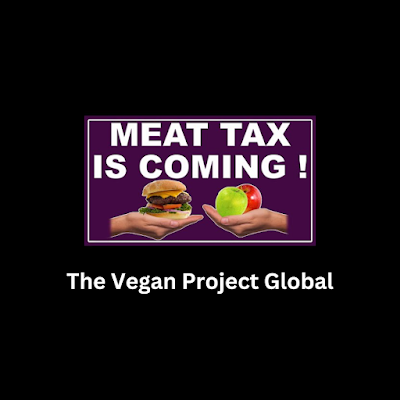"A tax on meat can be a powerful catalyst for promoting sustainability and improving public health, steering us towards a future where our choices align with the well-being of the planet and ourselves."
The global demand for meat has skyrocketed in recent decades, raising concerns about the environmental and health consequences associated with its production and consumption. As we grapple with the urgent need to address climate change and public health issues, implementing a tax on meat is a measure worth considering. By discouraging excessive meat consumption, such a tax can have multiple benefits, including mitigating environmental damage, improving public health, and promoting more sustainable food systems.
''Rearing livestock and growing crops to feed them has destroyed more tropical forest and killed more wildlife than any other industry. Animal agriculture also produces vast quantities of greenhouse gas emissions and pollution. The environmental consequences are so profound that the world cannot meet climate goals and keep ecosystems intact without rich countries reducing their consumption of beef, pork and chicken.'' - The Conversation
Environmental Impact:
Livestock production, particularly intensive animal farming, contributes significantly to greenhouse gas emissions, deforestation, and water pollution. By imposing a tax on meat, we can encourage individuals to reduce their consumption, leading to a decrease in the demand for meat products. This reduction would help alleviate the strain on our planet's resources, including land, water, and energy, and contribute to mitigating climate change. A tax can also incentivize the industry to adopt more sustainable farming practices, such as regenerative agriculture and reduced use of antibiotics, thereby promoting environmental stewardship.
Public Health Concerns:
The excessive consumption of meat, especially red and processed meats, has been linked to various health issues, including heart disease, obesity, and certain types of cancer. A tax on meat would help raise awareness about the potential health risks associated with its overconsumption. By making meat less affordable, individuals may be motivated to explore healthier alternatives, such as plant-based proteins, which are often more environmentally friendly and can offer numerous health benefits.
Economic Considerations:
Implementing a tax on meat can generate significant revenue that can be directed towards funding public health initiatives, promoting sustainable agriculture, and supporting research and development of alternative protein sources. The revenue generated can also help offset the costs associated with the environmental damage caused by intensive livestock farming, such as deforestation and water pollution. Additionally, this tax could create new economic opportunities in the form of plant-based protein production and other sustainable food industries, leading to job creation and economic growth.
Behavioral Change and Consumer Awareness:
A tax on meat can act as a powerful tool to shape consumer behavior. By making meat more expensive, individuals will be incentivized to consider alternative dietary choices. This can pave the way for a transition to more plant-based diets, which have been shown to have numerous health and environmental benefits. Over time, such a shift can contribute to the creation of a food culture that prioritizes sustainable and healthier eating habits, ultimately benefiting both individuals and the planet.
Addressing Equity Concerns:
It is essential to consider potential equity concerns that may arise with the implementation of a meat tax. Measures should be taken to ensure that vulnerable populations have access to affordable and nutritious alternatives. Government programs and subsidies can be directed towards making plant-based proteins and fresh produce more affordable, ensuring that all individuals have access to healthy and sustainable food options.
Conclusion:
In the face of mounting environmental challenges and public health crises, implementing a tax on meat is a proactive step toward creating a more sustainable and healthier future. Such a tax can promote responsible consumption, encourage dietary diversification, and reduce the burden on our planet's resources.
By generating revenue, supporting sustainable agriculture, and fostering consumer awareness, we can pave the way for a more equitable, environmentally conscious, and health-driven society. It's time we take this bold step towards a better future for ourselves and generations to come.
Resources:
"Livestock's Long Shadow: Environmental Issues and Options" by the Food and Agriculture Organization (FAO) of the United Nations: This comprehensive report examines the environmental impact of livestock production, including greenhouse gas emissions, deforestation, and water pollution. It highlights the need for sustainable practices and discusses the potential role of taxation in reducing the environmental footprint of the meat industry. You can find the report here: http://www.fao.org/3/a0701e/a0701e.pdf
"Taxing Meat: Taking Responsibility for the True Costs of Animal Agriculture" by Farm Animal Investment Risk and Return (FAIRR) Initiative: This report provides insights into the external costs associated with livestock production and proposes the idea of a meat tax as a means to address these costs. It explores various tax scenarios and their potential environmental, health, and economic impacts. The report can be accessed here: https://www.fairr.org/report/taxing-meat/
"Environmental Impacts of Food Production and Consumption: A Report to the Department for Environment, Food, and Rural Affairs" by the Sustainable Development Research Network: This report evaluates the environmental impacts of different food products, including meat. It discusses the potential of environmental taxation, such as a tax on meat, to incentivize sustainable food choices and reduce environmental harm. The report can be found here: https://www.sd-research.org.uk/publications/environmental-impacts-food-production-and-consumption
"Meat Taxes: Assessing the Potential Impact on Human Health and the Environment" by The Lancet Planetary Health: This research article examines the potential health and environmental benefits of implementing a tax on meat. It discusses the reduction in premature deaths and greenhouse gas emissions that could result from reduced meat consumption. The article can be accessed here: https://www.thelancet.com/journals/lanplh/article/PIIS2542-5196(18)30206-3/fulltext
"Red Meat Taxes: The Importance of Dynamic Analysis" by the World Resources Institute (WRI): This policy brief explores the potential benefits and challenges associated with implementing a tax on red meat. It discusses the importance of considering dynamic effects, such as behavioral changes and market responses, in assessing the impact of meat taxes. The brief can be found here: https://www.wri.org/publication/red-meat-taxes-importance-dynamic-analysis

Comments
Post a Comment
We welcome your input!